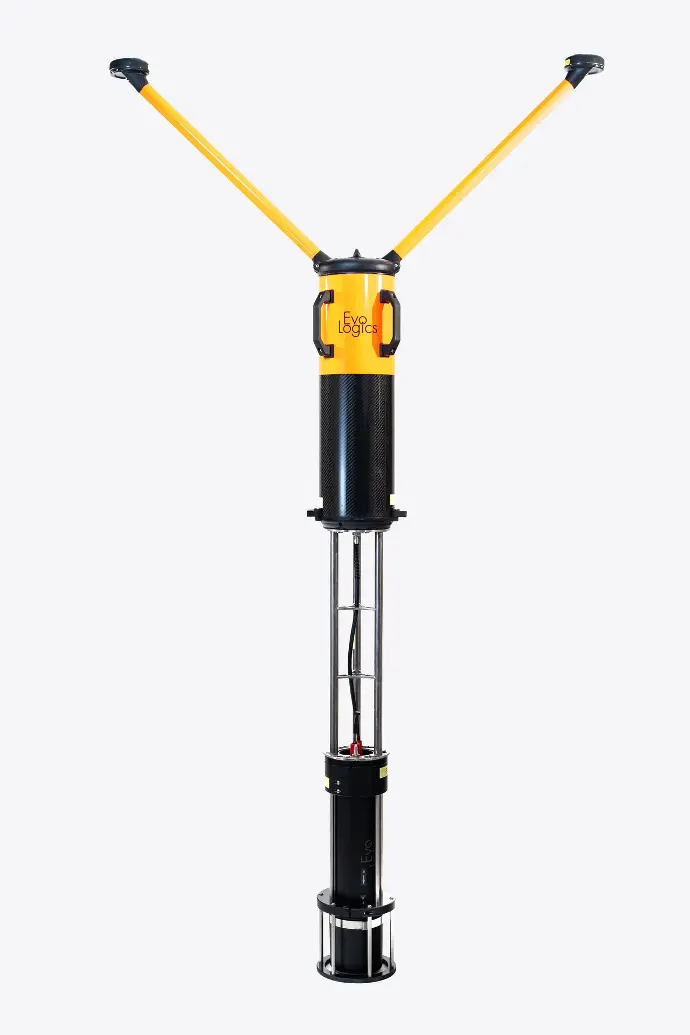S2C USBL Buoy
Fully integrated positioning solution

S2C USBL Buoy
The USBL buoy is a fully integrated deployment-ready unit based on EvoLogics S2C USBL devices. All system components are pre-configured, calibrated and ready-to-go:
- USBL transceiver with a built-in battery, mounted to a floating unit with on-board PC, dual-antenna GNSS receiver and Wi-Fi access point
- On-board PC runs pre-installed SiNAPS, the EvoLogics positioning software
- USBL data and control over Wi-Fi
- NMEA data stream for custom processing
- Light and compact no-foam buoyancy
- Packs up into a single case and can be easily transported, assembled and deployed by a single operator
Buoy configuration is available for all S2C USBL-series devices.
Applications include
Positioning, navigation and communication for unmanned underwater vehicles
Diver tracking
Underwater acoustic sensor networks
The design concept of the system derives from fishing floats that remain highly stable even in rough seas thanks to their long stems and minimal cross-section near the surface. This allows the elongated buoy to remain stable in harsh conditions, and when deployed close to a vessel hull or pier walls, where the waves are taller.
The buoyant body of the unit is made of carbon and glass fiber composites, making it lighter, more compact and robust than conventional designs with foam-based floatation collars.
The system packs up into a single case and can be easily transported, assembled and deployed by a single operator.

The integrated system eliminates the need to use external GNSS receivers for geo-referenced positioning of underwater targets. Dual GNSS antennas provide accurate yaw measurements without being affected by magnetic interferences. The optional RTK increases precision and accuracy. Moreover, as both sensors are part of the same hardware assembly, it is not necessary to calibrate the relative position of the USBL and the GNSS receiver.
The on-board PC runs the pre-installed SiNAPS, EvoLogics positioning software. The user can access USBL positioning data by connecting to the Wi-Fi access point of the buoy and opening the web-based SiNAPS interface. SiNAPS allows to operate the system and visualize the location of the buoy and target transponders. Furthermore, positioning data can be streamed as NMEA strings and input into other applications that can process this information in real-time.
S2C USBL Buoy - CONFIGURATION EXAMPLE
S2C R 18/34 USBL Buoy
| Housing | Delrin |
Operating range | up to 3500 m |
Acoustic connection | up to 13.9 kbit/s |
S2C USBL Buoy
TECHNICAL SPECIFICATIONS
Operating range | 1000 - 10 000 m depending on the model* |
Frequency | High-, mid- and low-frequency models* |
Transducer Beam Pattern | Directional and omnidirectional models* |
| Type | S2C USBL Device |
Slant range accuracy | 0.01 m |
Bearing resolution | 0.1 degrees |
Nominal SNR | 10 dB |
Host interface | Ethernet |
Integrated AHRS | Integrated xSens MTi 30 |
| GNSS | Dual antenna, GPS, GLONASS, optional RTK or Base-Rover configuration |
Radio communication | WiFi 2.4 GHz, dual antenna |
On-board PC | Pre-installed SiNAPS Software |
| Power Consumption | |
Stand-by Mode | 2.5 mW |
Listen Mode | 5 - 285 mW |
Receive Mode | 0.8 W |
Transmit Mode | up to 70 W depending on model* |
Power Supply | |
Internal | Internal rechargeable Li-Ion battery, 156 Wh (NiMH optional) |
| Dimensions** | |
Total/main body | 1138 x 280 x 2240 mm / Ø 180 mm |
Over-/underwater | 690 mm / 1550 mm |
Weight in air/buoyancy | |
Delrin | 19 kg/ TBC |
Buoyancy | Composite carbon and glass fiber body |
Assembly | Dismantles into 3 parts, quick-release fasteners |
| Remote station | Direct connection from a PC (up to 50 m) or an optional rugged unit with a powerful WiFi module, antenna, rechargeable battery, Ethernet (up to 200 m range) |
* See S2C R USBL-series flyer for details
** Dimensions and weight for S2C 18/34 USBL Buoy in Delrin housing. Dimensions and weights of other builds vary